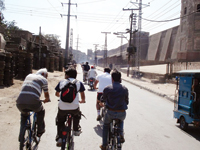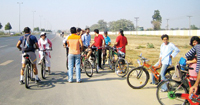Critical Mass Lahore is celebrating its second anniversary today. Critical Mass is a group of cyclists that originated in Lahore, Pakistan. However, the idea has been prevalent in some 200 countries abroad where cycle rides take place on the last Friday of the month. In Lahore, it is organised on Sundays, and sometimes, special riding events take place.
The participants belonging to diverse backgrounds gather at Zakir Tikka restaurant. Sometimes the rides include foreigners too and take about 3 to 5 hours time, depending on the route.
The mass is perceived as a "protest activity" and is one of the most successful examples of non-violent direct actions. Critical Mass, which originated in San Francisco in 1992, lacks a leadership hierarchy. It is a spontaneous group of cyclists, who show up every Sunday. Either someone distributes the route guideline or else someone suggests a route verbally. This disorganised character of the group prevents government backlash, unnecessary police involvement or legal clampdown.
There are several reasons to cycle through the city. The foremost being that cycle rides are environmentally friendly. Automobiles are the largest source of air pollution and global warming. Plus developing countries spend a huge chunk of their GDP purchasing oil to run these vehicles. Cycling is a good alternative to escape from this economic dependence on oil.
 "Everyone cycles for his own reason," says Aysha Raja, a regular Critical Mass participant. "Some do it for fitness or environmental activism but I do it because I want more women to cycle. And their number is increasing slowly." She believes that cycling is a good alternative to public transport for women. Aysha adds that cycling for daily errands gives one a chance to interact with one’s neighbours and bond as a community. Since cycling is quicker than walking, she skips harassment too. Before people realise there is a woman on a bicycle, she is several paces ahead. She regrets that people still reach the Critical Mass events on automobiles and hopes this will improve. However, she doesn’t want to make the rides too taxing or difficult by barring people from using their vehicles.
"Everyone cycles for his own reason," says Aysha Raja, a regular Critical Mass participant. "Some do it for fitness or environmental activism but I do it because I want more women to cycle. And their number is increasing slowly." She believes that cycling is a good alternative to public transport for women. Aysha adds that cycling for daily errands gives one a chance to interact with one’s neighbours and bond as a community. Since cycling is quicker than walking, she skips harassment too. Before people realise there is a woman on a bicycle, she is several paces ahead. She regrets that people still reach the Critical Mass events on automobiles and hopes this will improve. However, she doesn’t want to make the rides too taxing or difficult by barring people from using their vehicles.
The movement has a colour of socialism in it. "Critical Mass is about showing that a man or a woman on a cycle is the same as one in a ten lakh car," says the Critical Mass website. Naeem Bajwa, a geologist and green activist says that he wants to win his streets back from the cars. "Cyclists have no rights here, despite the fact that Pakistan is a poor country and most people cannot afford cars. We want to challenge the class segregation against cyclists, who are perceived as poor. There is an increasing awareness in the society that cycles are not just cheap transport, but also healthy and green."
Internationally, the chief criticism against Critical Mass is that it breaks the traffic laws. However, when the road infrastructure is provided by the Government of Pakistan, they don’t consider cyclists, cycles or pedestrians. However, there is a ray of hope, because many cities like Bogotá, Columbia have developed these policies and infrastructural changes after the arrival of civic pressure groups and public awareness. As a result, crime and accident rate has decreased there and the air quality has improved.

Naeem Iqbal, the spokesperson for Critical Mass states that there are 30 plus weekly participants but the number can increase to a hundred plus in special events. TNS inquired him about medical emergencies. "Although we have been around for two years, no civic society organisation has offered us medical aid in case of accidents." He adds, "We have never had a serious accident, people occasionally fall and have a few scratches, nothing serious."
Ramis Jamal, an 8th grader who joins the ride every week, finds the ride physically strenuous but useful. "There is hardly an interesting place in the city we have not visited. May it be the Landa Bazaar, Miani Sahib or outskirts of Lahore."
Naeem Iqbal said that on the last Sunday of the year, Critical Mass will survey the old city of Lahore and savour its architectural and historical sights. Naeem added that "starting from Nila Gumbad, we will enter walled city, going through Said Mitha Bazar, Paniwala Talab, Rang Mahal, Kashmiri Bazar going all the way to Chohata Mufti Baqar a neighbourhood known for ‘Gurdwara Guru Nanak,’ later a momentous Mughal monument of ‘Mariam Zamani Mosque’ and ‘Qila Lachhman Singh’.
Critical Mass is also a virtual success story in Pakistan because it utilizes Facebook invites to organise the events. The online tool is free and influential. It is very rare in Pakistan that activism is done without much cash rolling in from foreign donors. Critical Mass is a local and public initiative. People bike together but with a different reason in mind. Plus each member can take an initiative and be heard. Hopefully, the events will remain persistent and the membership will grow in size, like it has in the west. Young and old promoting good practices alike.
This piece was first published in The News in December 2011.

No comments:
Post a Comment